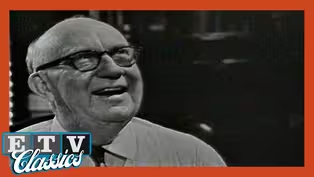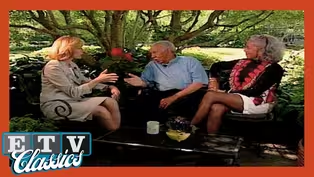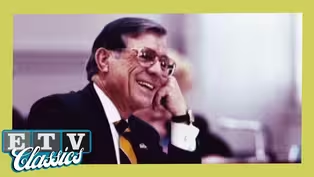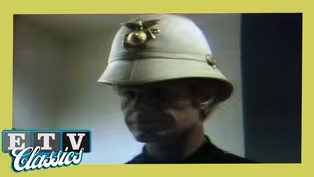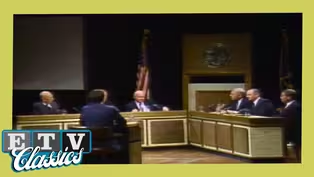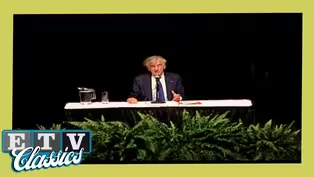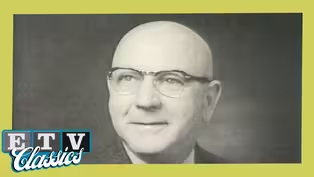ETV Classics
Strom Thurmond At The Seat of Power (1982)
Season 15 Episode 20 | 29m 49sVideo has Closed Captions
The documentary follows the life and career of Strom Thurmond.
The documentary follows the life and career of Strom Thurmond pointing out his successful write in campaign in 1954, history with the Dixiecrats, and party-hopping in 1964 that would shake up politics thereafter. Extensive interviews of Senators, reporters, pundits, and government officials on both sides of the aisle highlight the career of Strom Thurmond.
Problems playing video? | Closed Captioning Feedback
Problems playing video? | Closed Captioning Feedback
ETV Classics is a local public television program presented by SCETV
Support for this program is provided by The ETV Endowment of South Carolina.
ETV Classics
Strom Thurmond At The Seat of Power (1982)
Season 15 Episode 20 | 29m 49sVideo has Closed Captions
The documentary follows the life and career of Strom Thurmond pointing out his successful write in campaign in 1954, history with the Dixiecrats, and party-hopping in 1964 that would shake up politics thereafter. Extensive interviews of Senators, reporters, pundits, and government officials on both sides of the aisle highlight the career of Strom Thurmond.
Problems playing video? | Closed Captioning Feedback
How to Watch ETV Classics
ETV Classics is available to stream on pbs.org and the free PBS App, available on iPhone, Apple TV, Android TV, Android smartphones, Amazon Fire TV, Amazon Fire Tablet, Roku, Samsung Smart TV, and Vizio.
Providing Support for PBS.org
Learn Moreabout PBS online sponsorshipMore from This Collection
Find classic news and public affairs programming from South Carolina ETV.
Open Line: Carolina to Shanxi (1980)
Video has Closed Captions
An exchange program for higher education between USC and the people of China's Shanxi Province. (28m 51s)
Charleston Place | Carolina Journal (1986)
Video has Closed Captions
This edition of "Carolina Journal" revisits the opening of the Charleston Place complex. (27m 20s)
U.S.S. South Carolina | Carolina Journal (1984)
Video has Closed Captions
Michael Collins goes aboard the missile cruiser U.S.S. South Carolina as it visits its namesake. (28m 54s)
Strom Thurmond Remembered (2003)
Video has Closed Captions
Charles Bierbauer reviews the life and accomplishments of South Carolina Senator Strom Thurmond. (1h 51m 22s)
Profile: The Senator from Barnwell: Edgar A. Brown (1967)
Video has Closed Captions
A visit with the venerable Edgar A. Brown in his law office, home, and the streets of his hometown. (14m 42s)
A Conversation with Justice Ernest Finney, Jr.: A Lifetime of Success (2000)
Video has Closed Captions
The honorable Judge Ernest A. Finney, Jr. discusses his life, career, and legacy in SC's lawfare. (27m 47s)
Profile: Senator John Drummond of Ninety-Six | The Big Picture (2008)
Video has Closed Captions
The life and times of Senator John Drummond of Greenwood, South Carolina. (26m 53s)
Video has Closed Captions
The memoirs of three businessmen who attribute their successes to their time in the US Marine Corps. (28m 54s)
The Governors' Roundtable | Carolina Journal (1989)
Video has Closed Captions
A round-table discussion with nine men who served as governor of the state of South Carolina. (57m 54s)
Elie Wiesel | Solomon Tenenbaum Lectureship in Jewish Studies (2006)
Video has Closed Captions
Professor Elie Wiesel, first Nobel laureate delivers a lecture as a part of the Tenenbaum series. (1h 17m 18s)
Solomon Blatt: Speaker Emeritus of the SC House | Carolina Journal (1985)
Video has Closed Captions
The life and career of Solomon Blatt, Speaker Emeritus of the S.C. House of Representatives. (27m 49s)
Remembering Bill Moyers: War in the Gulf - Town Meeting (1991)
Video has Closed Captions
Bill Moyers, who died June 26, 2025, was an award-winning journalist and PBS host. (59m 32s)
Providing Support for PBS.org
Learn Moreabout PBS online sponsorship♪ Beryl> For over a half century, J. Strom Thurmond has been a political figure, from superintendent of education in an obscure South Carolina county to president pro tempore of the United States Senate.
Today Strom Thurmond sits at the seat of power.
♪ ♪ Beryl> With the Republican victory sweep of 1980, Strom Thurmond, the venerable senior senator from South Carolina, came into his own.
The ranking member of the majority party, Thurmond assumed the important chairmanship of the powerful Senate Judiciary Committee.
Additionally, as president pro tempore of the Senate, Thurmond would stand third in line in the ascension to the Presidency itself.
While the media speculated on its impact, Thurmond modestly but straightforwardly accepted both the challenges and the power of his position.
Thurmond> By having a Republican President in the White House, so many people now call on the Republican members because they have better contacts.
And also, by the Republicans taking over the Senate, the senior members, like myself, have become chairmen of committees.
I am the senior Republican, and I am, by virtue of that, as much as anything else, I guess, although we have to be elected by the whole Senate, the president pro tempore of the Senate.
I open the Senate every morning.
Incidentally, we have a chaplain to open the Senate with a prayer too.
I announce that.
And I'm chairman of the Judiciary Committee, and we have great responsibilities there.
We handle more legislation than any other committee in the Senate.
Beryl> In early meetings with reporters, Thurmond spelled out his goals for the Judiciary Committee.
He called for repealing the voting rights laws and pressing for constitutional amendments to outlaw abortions, ban forced bussing, and restore voluntary prayer in the schools.
Apprehensive tremors rocked the liberal community, which braced itself for an all-out attack on social issues.
But the anticipated onslaught did not occur.
Instead, social issues were quietly pushed into the background.
Thurmond> We were trying to put first the economic situation that affects the country worse.
I would not deny any member the right to bring up any bill that he's introduced.
He'd have that right to do that.
I think there are a lot of things along economic lines-- reduce the budget and cutting spending and reducing taxes and so forth-- that deserve such a high priority that we felt that those matters ought to have the presence, the preference, and the priority.
Beryl> Senate colleagues verify Thurmond's broad-minded approach Sen. Paul Laxalt> I've served on the Judiciary Committee for a long time with him.
And I can remember when we came in the majority, there were many concerns expressed in the media and otherwise, that we were going to go into almost a despotic era within the Judiciary Committee, and the liberals, particularly, on the committee would be arbitrarily shut out.
I don't know how many you've talked to on the show but if they are fair-minded and honest about it, they'll be the first to tell you that he's been a responsible, very reasonable chairman and has conducted those hearings very fairly.
So those early perceptions in the minds of fair-minded people have proved to be absolutely wrong.
>> Thurmond is not an ideologue like Senators Jessie Helms and Senators East or some of the others in his party.
Thurmond really is a super-politician, and he knows what he can get; he knows what he can't get.
In talking with the Democrats on the Senate Judiciary Committee, they have been pleasantly surprised with Thurmond as chairman.
They have found him extremely cooperative.
He hasn't tried to railroad anything through the committee, and as a result, because of his cooperative attitude, Thurmond is able to get along with people like Senator Kennedy of Massachusetts and Senator Biden of Delaware.
Sen. Joesph Biden Jr.> Well, you know, it's kinda hard for a guy who's labeled as a liberal Democrat to say this.
I'm his counterpart on the Democratic side, and I think his style is, he's both fair and he's effective.
He's a quintessential legislator.
He wants to get things done.
Unlike some of the right-wing purists that are up here talking about changing the Fourth, Fifth, and Eighth Amendment and blowing everything away in the Constitution, Strom Thurmond has been as reasonable as the devil as chairman.
Thurmond> In order to be effective up here you've got to try to make friends with everybody you can and be helpful to the other senators.
That's been my policy, and as a result, I've gotten good cooperation from them.
Sen. Robert Dole> I think Strom's strength is the fact, he gets along with everyone.
He may not agree with you, with me or with somebody else on the committee from a philosophical standpoint, but everybody's going to let everybody, everybody's going to have a chance to be heard.
nobody's going to be shut off, and he's going to hustle as much as he can to get the bill moving.
And we meet two, three, four times a week.
So, I think anybody on the committee, everybody, Democrats as well as Republicans, would say that he's fair, he's honest, and that he's tolerant.
And you can't-- that's, as far as I'm concerned, the measure of a good chairman.
Harry Dent> One of the reasons, that he's worked out so well as Senate Judiciary Committee chairman.
And you know there were some who didn't want him.
Even Teddy Kennedy pays tribute to him.
All the others on the committee, they say he's fair, and they say that they find that he's not bullheaded-- or as the Senator would say, pigheaded, you know, about matters, that he makes his point, and then he moves on if he cannot win.
So that has gained him probably more respect than more people figured he might merit when he came into a leadership position in the United States Senate.
Beryl> That Thurmond has been able to function effectively in his new role comes as no surprise to those who followed his career, in ernest.
In 1928, young Strom Thurmond, a high school coach and teacher, ran for his first elective office and won.
While serving as county superintendent of education, he studied law under his father, then took and passed the bar.
In January of 1933, he was elected to the state senate.
Five years later, he won an appointment as circuit judge.
Although judges were exempt from military service, Thurmond volunteered for the armed forces the day war was declared against Germany.
Thurmond> I was attached to the 82nd Airborne Division for the invasion of Normandy.
We jumped off on D-Day and landed in Normandy.
I stayed and fought with them for about a month.
Beryl> Following the war, Thurmond returned to the bench.
In 1946 he resigned the judgeship to run for governor.
He won among a field of 11 candidates.
Two years later, the South Carolina governor was drafted as a Presidential candidate, representing the States Rights Party.
♪ Announcer> In Birmingham, the stars and bars of the Southern Confederacy.
The Dixiecrat Convention for states' rights is in session.
♪ Candidates are named to run against President Truman and the civil rights polic.
♪ For President: South Carolina's J. Strom Thurmond, breathing defiance.
Thurmond> In the words of John Paul Jones, "We have just begun to fight."
(crowd cheers) Beryl> It was this stance that earned Strom Thurmond the lingering reputation of states' right advocate and staunch segregationist.
Thurmond> Well, so many people misconstrued, I think, the race that I ran for President in 1948.
...That was really a race of federal power versus state power; whether the federal government's going to take over practically everything, as they've tried to do and have been doing to a large extent for the last 35 years, or whether you're going to follow the Constitution and leave with the states the rights reserved to the states under the constitution.
See, when the Union was formed, the states had all the power.
They formed the Union and gave the states certain powers, but they reserved all other powers.
But so many people have involved and injected the federal government into almost every conceivable field of activity.
And that race was barely construed-- as far as I was concerned, the 1948 Presidential race was not a Presidential race concerning color or race.
It was trying to preserve the rights of the states and preserve the Constitution of the United States.
Beryl> Back home, Thurmond was considered one of the most liberal governors South Carolina had ever known.
It was during this period he entered his first race for the U.S. Senate.
Harry Dent> I got involved with Senator Thurmond in 1950 in the only race that he ever lost, which was his run for the United States Senate against incumbent Senator Olin D. Johnston.
I was a student at Presbyterian College, and the Senator, who was then governor, drafted me as a student to drive him all over the state of South Carolina in the last toe-to-toe, courthouse-to-courthouse Democratic primary stump campaigns.
And was it something!
I had to separate the two of them one time, it got so hot.
Beryl> Following that unsuccessful bid, Thurmond entered private practice as a lawyer.
But dissatisfaction with the Democratic nomination process led to a remarkable feat.
In 1954, in true populous style, Thurmond eschewed the dictates of modern politics and captured a Senate seat on a write-in vote.
It was a feat never before accomplished in the history of the U.S. Senate, nor repeated since.
Catapulted into national politics once again, the fledgling senator quickly established himself as a vocal conservative on the Hill.
He championed a strong defense, a tough foreign policy, and, of course, the sovereign rights of the states.
In 1957, he delivered the longest speech ever made in the Senate: 24 hours and 18 minutes in defense of jury trials.
Still, he won few victories on the Hill.
Lee Bandy> Well, when I first came here, Senator Thurmond, of course, was a Democrat.
And back then, the Senator had a reputation of saying a lot of things about a lot of issues but not being able to deliver, or as they said back then, "bring home the bacon" to South Carolina.
And I think that was accurate back then when the Senator was a Democrat.
Beryl> For Thurmond, it was a difficult and risk-proned decision, yet in 1964, he switched parties in support of GOP Presidential candidate Barry Goldwater.
>> He did that on the basis of Lyndon Johnson's unpopularity in South Carolina that related primarily to civil rights questions.
That was the issue then as it was in '48.
Senator Thurmond struck a very, very conservative pose with respect to civil rights, and he exploited that issue extremely well.
Harry Dent> Strom Thurmond got his freedom then, because he really was, at heart, more a Republican than he was a Democrat.
He was a dissident, dissatisfied Democrat.
The Democrats, you know, didn't care for him because he was always stepping out of line, so far as they were concerned.
The Republicans welcomed him with open arms, and he became a national leader in a new political party, so far as he was concerned.
I have seen the liberation of Strom Thurmond in that move.
Beryl> Unexpected moves seemed to characterize Thurmond's life.
A widower, in 1968, against all political advise, the courtly Thurmond wooed and won a young wife over 40 years his junior.
Minister> When therefore, what God hath joined together, let no man put asunder.
Let us pray.
Now may the Lord bless you and keep you, Strom and Nancy.
May the Lord make his face to shine upon you and be gracious unto you.
May the Lord lift up his countenance upon you and give you peace, both now and in the life everlasting.
Amen.
♪ [organ music] ♪ Beryl> Today, Thurmond, his wife Nancy, and four children juggle his hectic schedule in an attempt to find time for a normal family life.
The family maintains a residence in South Carolina and a home in a Virginia suburb.
Nancy Thurmond> I would have to be honest in that certainly, Strom does belong to the public, and there are times when we have to postpone family celebrations, anniversaries, birthday parties until there is free time for us to have family time together.
I really knew what I was getting into before we married, although, certainly, the addition of four children has complicated our life a great deal schedule-wise.
But there are times when I wish that he were more available at home, but we've tried to compromise and make ourselves available to him, in that We can't expect him to be home in the evening at 5:00 or 6:00 o'clock.
When appropriate, we'll often go up to the Capitol to see him or you know, we'll take the children to South Carolina so we can all be together.
Thurmond> Put your hands up.
That's right.
That's it.
Nancy> Go, Strom!
Nancy> Physical fitness plays a very important role in our lives.
The children are all very active.
Strom is extremely energetic and active, and I have to keep up with all of them, so I guess I, too, try to follow their routine.
Beryl> What is the side of Strom Thurmond that you'd like the public to see that they never get to see?
Nancy> Well, I guess the side that we see all the time, the very human side.
He's a very concerned husband and a very involved parent.
He goes to PTA meetings, and he helps children swim or bicycle or with their homework, and I think that normalcy is what it's hard for people to realize that someone in public life is just a normal person.
Beryl> For Thurmond, normalcy is hard to achieve with a day that begins at dawn and goes till midnight.
His colleagues consistently refer to the strenuous pace he keeps.
Sen. Dole> He's at work every minute.
You never see Strom Thurmond he's not in a hurry, when he's not doing something for someone, or trying to get you to come to his committee meeting or introducing you to somebody from South Carolina.
Sen. Jesse Helms> He is a prodigious worker.
He is on top of more things at one time than any fellow I ever saw, and he has boundless energy!
Lee Bandy> The Senator is a hard worker.
He works a lot behind the scenes, and he's the kind of person who depends a great deal on his staff.
He realizes his weaknesses in many areas, and he hires strong people to help him in those areas where he is weak.
I think that's a testament to his career, that he recognized the fact that he needed a strong staff.
Michael Schick> Senator Thurmond expects the same amount of energy and dedication and loyalty from the staff that he exerts himself, which is very demanding.
A new staff member coming board and expect, maybe, a 9-to-5 job, and there's-- it's just not that way, because Senator Thurmond is not a 9-to-5 senator.
Beryl> Perhaps the greatest challenge for Thurmond thus far in his role as Judiciary chairman has been presiding over the controversial Voting Rights Bill extension debate.
Thurmond's early efforts to defeat the extension provoked Blacks, and Edgefield, the county of his birth, became a target for voting rights protesters.
♪ We going to walk ♪ in Thurmond's town.
♪ (group echoing) ♪ We going to walk in Thurmond's town.
♪ ♪ You know those hills are ♪ mighty steep... ♪ Beryl> Why demonstrate in Edgefield County?
Jesse Taylor> Well basically, we wanted to let Senator Thurmond know that Black people in South Carolina were upset about his position on the Voting Rights Act.
He said in November of 1980 that he was going to kill the Voting Rights Act, We thought that was a fundamental law for the rights of Black people in South Carolina throughout the South.
We wanted to make sure, that he, the people of South Carolina, and the nation knew we were not going to stand for it.
Rev.
Joseph Lowery> One hundred years ago... [crowd chattering] One hundred years ago, a man named Thurmond-- (crowd jeers) Yeah!
Rev.
Joseph Lowery> led the movement in South Carolina to disfranchise Black folk.
(crowd jeers) Rev.
Joseph Lowery> Here we are, one hundred years later, facing a man named Thurmond trying to disfranchise Black folk.
We came today... Beryl> In the end, Thurmond surprised almost everyone when he voted for the simple bill extension.
Thurmond> And so I felt it should apply nationwide, whatever law was passed.
There wasn't too much sentiment for that, so the question came, the President recommended that we renew the present voting rights law for ten years and allow reasonable bailout for a state or any political subdivision that is entitled to bail out if they're not discriminating.
Well, that would seem reasonable, but it seems that there's even objections to the bailout, so then it came down to the question of probablu whether the House bill will be pushed or whether the present law would be extended.
Everybody who's worked with the voting rights law has been pleased with it.
They said it's done a lot of good.
So I voted just to renew the present law.
Beryl> Thurmond's longstanding record against civil rights has yielded a legacy of mistrust on racial matters, particularly on the part of Blacks.
Jesse> It's a mixture of fear, and hatred.
There's some admiration among a very, very small portion of the Black community.
But overall, Black people remember Senator Thurmond for the things that he has done.
Those who weren't around in the 1960s or the '50s and the '40s where his main activity was, they certainly remember him for the last couple of years as being the main public figure in the country trying to kill the Voting Rights Act.
People remember that and they are going to watch closely in '84.
Dr. David Williams> Not being from South Carolina, having read a great deal about the Senator, having heard a great deal about him, I felt I would be tackling one of the most difficult tasks that I would have in coming to this great state by meeting with the Senator to talk about Allen University.
But I was surprised after meeting with the Senator, and uh, the way that he has responded to my concerns and needs here at Allen University.
Beryl> A strong law and order advocate, the Senator predictably has spent a great deal of effort on crime bills.
Thurmond> Crime is the greatest enemy internally of this country, and we must take steps to make people feel safe on the streets and in their homes.
If we get mandatory prison sentences for instance, for a person who commits a crime with a gun, he'd get a sentence not only for committing the crime, but he would get a prison sentence for carrying the gun when he committed the crime.
We think such bills as that will help a lot to bring down crime.
Beryl> Another Thurmond priority is the passage of a federal death penalty law, a carryover from his days as a circuit judge in South Carolina.
Thurmond believes capital punishment is a deterrent to crime.
In Congress, Thurmond's influence among young senators is legendary.
Sen. Ted Steven> Strom's greatest contribution, in my opinion, is in the way he treats new senators.
You all probably don't see that, but we see that.
He seeks out the new senators.
He talks to them.
He takes...the time to go visit with them in their office.
We all remember that, the time when Strom, who, you know, is the most senior on our side, came to our office to visit with us when we were new senators.
Sen. Paul Laxalt> I can remember as a young politician myself, running for office on the state level, when I'd make many inspiring speeches, at least to me, saying that seniority in the Congress and particularly in the Senate was all wrong, and those who were older should leave.
When I came back here and observed what Strom Thurmond and others were doing, I came to a cold realization that couldn't have been more wrong.
Sen. Orrin Hatch> He's certainly taken me under his wing.
I've been on the Judiciary Committee since I've been in the Senate.
Strom Thurmond has been one of the greatest influences.
of my life.
Beryl> Nor have Thurmond's recent accomplishments gone unnoticed.
Even his rivals give credit where due.
Sen. Ernest Hollings> As the chairman of our Judiciary Committee, he's done an outstanding job here this year.
And last, everyone will agree with that.
Because he knows now over the years, how to work with people.
There was perhaps a time in his career when he was just barreling forward on his own principles and beliefs, and in the last couple of years or so now, he's learned to work with all elements, and he has a great credibility and a great persuasiveness.
They will stop look and listen, and I think he's very effective.
Sen. John.
B. Tower> I think he's one of the most able, hardworking senators that I've ever seen.
I've served with Strom throughout my Senate career of 22 years, and, I'm especially impressed by the way he's dedicated himself to rebuilding the defense capability of the United States.
He serves on the Armed Services Committee of which I'm chairman and certainly does an outstanding job, and makes a real contribution, does his homework, knows the subject.
I think he's made a great contribution to his country.
Sen. Charles H. Percy> It's the thoroughness, with which he does things the conviction from which he does things, the sense of compassion and understanding.
He thoroughly understands the legislation he works on.
He thoroughly understands the judicial process, for instance and I give him a great deal of credit for upholding the quality of federal judges, U.S. attorneys, and so forth.
That power alone, the judicial power that he has in oversight, and the responsibility he has to serve the Senate, in that regard, plus his duties as president of the Senate-- He's a pride and joy every time he comes before a meeting of the Foreign Relations Committee we're having with a chief of state or foreign minister, prime minister.
whatever it may be.
Sen. Hatch> Strom Thurmond was the leader for the first balanced budget amendment to the Constitution in the history of this country to ever come to the floor of the United States Senate.
He led that fight on the floor.
It was a difficult thing.
You know, there have been 10 thousand constitutional amendments proposed in the history of this country.
But only 34 have come through this system, and that's one of them.
Strom Thurmond was the leader on the floor.
I can remember when it was really tense, where it looked like we might lose that on the floor of the Senate.
Strom just sat there, and got tougher than ever.
and really did a great job for the Senate and for, I think, the country as a whole.
Dole> Being really the president pro tem of the Senate puts him pretty high on the pecking order around this town and around this country.
But I think even beyond that is the fact that he is totally attentive to the needs of South Carolina.
I mean, some people, when they start getting national attention and national focus, forget where they came from, and I don't think Strom Thurmond ever has and ever will.
>> He has a great sensitivity about what people in South Carolina feel, how they think.
He has almost a sixth sense about him.
He knows how people think and feel.
That is his homing device.
He tunes into that better than anybody I know, and he responds to it with great flexibility.
And secondly, he gives extremely-- his office and he give very, very good constituency services.
They're very responsive to almost anybody who has a need or a concern.
Beryl> Has Strom Thurmond mellowed as a politician?
Thurmond> Well, I don't know about mellowed.
I've always felt kindly to people.
I've always tried to help people.
When I practiced law, if people could pay me a fee for defending them, okay, but if they couldn't, I'd take the cases anyway, and my goal is to serve the public, to serve all the people, and to help all the people.
>> I think that... that being in the majority as he is in the Senate, and being the senior Republican in the Senate, and being the chairman of the Judiciary Committee has had a very profound effect on Strom Thurmond.
He has--he feels the responsibility not only to his personal views, but also to his responsibility to help lead the Senate.
I guess that's mellowing.
but in any event, he has flourished and flowered in this new role as chairman of committee and president pro tem of the Senate.
I would not say mellowed; I would say grown.
>> Well, I'd say, number one, he's a man of tremendous ability.
He's a man of tremendous energy and activity.
He's one of the most, and through the years has been one of the most courageous members of the Senate, always willing to speak his mind and to fight for those principles of government in which he so deeply believes.
Sen. Hatch> I think he'll be remembered as a person who stood tall for morality and decency in government, who worked hard while he was here, who prevented a lot of very detrimental legislation, to this country, but who passed some of the most important legislation in this country's history.
Sen. Howard Baker Jr.> Strom Thurmond is probably one of the few true Senate professionals left in Washington, and I mean that to be a mark of high praise and a statement of personal affection.
Sen. Laxalt> All I can tell you that he's a good politician, every good sense of the word.
He may be trite, but he's a patriot.
Sen. Jesse Helms> He's a remarkable, remarkable man, and I could not express to you in any adequate way my admiration and respect for him.
He's a great American.
Sen. Dole> To sort of sum it up, the bottom line is, he's a just good, decent man.
We're proud to serve with him in the Senate.
Beryl> If you could write the South Carolina history text of the future, what would you write about Strom Thurmond?
Thurmond> That I tried to serve humanity to the best of my ability.
♪ ♪ ♪ ♪
Support for PBS provided by:
ETV Classics is a local public television program presented by SCETV
Support for this program is provided by The ETV Endowment of South Carolina.




